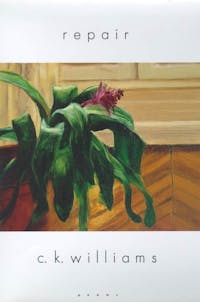Repair
Poems
 Download image
Download image
ISBN10: 0374527067
ISBN13: 9780374527068
Trade Paperback
80 Pages
$15.00
CA$17.50
Winner of the Pulitzer Prize and the Los Angeles Times Book Prize
A National Book Award Finalist
This is the eighth book of verse—and the most various yet—by one of America's leading living poets. An outpouring of nearly fifty new poems, Repair finds Williams experimenting more than ever with both form and line.
His subjects, again, are love, death, secrets among intimates, the waywardness of thought, and the violence and metaphoric power of the natural world. Social disorder is also a strong theme in these pages; a long poem about the sixties, "King," broods over the mixed motives and misunderstandings of that period—and our own. Here is a poet in full maturity, his mastery transforming everything he touches.
And throughout Repair, Williams maintains what Alan Williamson credits him with having so steadily developed from key French influences: "the poetry of the sentence."
Reviews
Praise for Repair
"A provocative, often gorgeous collection that brims with intellectual zeal and emotional honesty."—Jennifer Poyen, The San Diego Union-Tribune
"Williams spares neither himself nor the reader anything. This is his singular genius and passion, an absolute de0dication to trying to tell the truth in the most truthful way. Thus, Williams has slowly invented a new form of American free verse, one which most closely imitates our own casual speech . . . Repair possesses that exact, bewildering, slant rendering of raw emotion and careful thought that is characteristic of Williams's poetry."—Liz Rosenberg, The Boston Sunday Globe
"Formally, these new poems mark a departure. Underneath, though, they are driven by the familiar Willaims sensibility: intelligent, restless, perpetually unsatisfied, always wanting to know and understand more . . . [An] excellent book."—Troy Jollimore, The Boston Book Review
"In his long career Williams has performed a rare feat, forging a distinctive style by great labor without a late flop into exhausted mannerism. Past 60, newly a grandfather, he is still a foxy tinkerer, offering a good deal of variety in his characteristic long line, snaking into solid stanzas, couplets, and even prose blocks. He tries out new moods, ecstatic italics here; a bracing gust of Baudelaire's cool irony there; but his project remains consistent: rendering the broadstroke conflicts of consciousness as it arrives at points of decision. 'Risk' asks if we unknowingly crave disaster. An exchange of looks with a hare from within a stranded train allows his mind that trick of trying to go back into its wilder part. 'The Nail' tries to come to terms with how a dictator had gruesomely disposed of enemies (it's we who do such things). Throughout, Williams, following Lowell and Berryman, sets off after the sources of the self."—Publishers Weekly
"A prolific poet and translator, winner of numerous awards and fellowships, Williams is best known for his breathless, long, and often prosaic line. But in this eighth volume of poetry, he intersperses short-lined poems—perhaps his finest works to date. Focused and lyrical, they include delicate love poems set against precarious backdrops. 'Dirt,' for example, speaks of the grandmother who washed [the poet's] mouth out with soap and how he 'never, until now, loved her again.' One senses the poem itself becoming the instrument of healing and loving. Aptly titled, this entire volume deals with self-understanding in a world where there is 'no end to our self-shaping.' Williams's most compelling insights are often embedded in the mundane: the sight of his face in the mirror, a pair of shoes left on a windowsill. Together and apart, these images lead him toward 'the space within me, within which I partly, or possibly most, exist.' Yes."—Library Journal
"At his best, Williams is insightful, vulnerable, unblinking. He explores the hidden mental realms behind people's outward actions, and he leads us fearlessly behind the mind's closed doors."—Elizabeth Lund, The Christian Science Monitor
"Williams is known for his long lines, which have come to reflect the length and vitality of his writing life. Now a grandfather (an attainment he slyly celebrates in a poem with conspicuously baby-size lines), Williams has nonetheless retained a youthful ardor for inquiry into various states of being . . . [He] fully enters any given moment, whether it's a sudden inexplicable estrangement from a loved one or the pull of a troubling memory of his mother sipping coffee in the morning like some alien creature. Williams manages to be at once wistful and robust, philosophical and bewildered. He marvels at love, feels sorrow and helplessness over the tragedies of racism and poverty, and praises the ancient arts of 'forgiveness and repair.'"—Booklist



